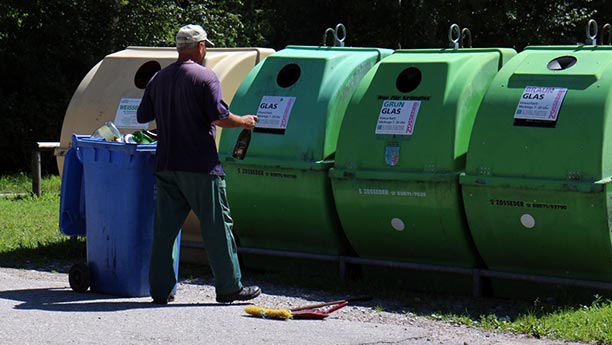How to Properly Dispose of Different Waste Types
by Addison Rigg
Posted on 01-08-2023 10:21 AM

Have you ever wondered what happens to your waste once it leaves your house? You toss it in the trash, and voila, it's out of sight, out of mind. But is it really that simple? Unfortunately, the answer is a resounding no. Proper waste disposal is a significant responsibility we all share and have an impact on the environment, health, and safety of ourselves and others.
Importance of Correct Waste Disposal
Understanding why correct waste disposal is vital extends beyond merely removing clutter from our living spaces. It intertwines with the sustainability of our planet and the well-being of all life forms.
Environmental Implications
When it comes to our environment, the impact of incorrect waste disposal is profound and far-reaching. Improperly disposed waste often finds its way into our waterways and oceans, wreaking havoc on marine ecosystems. Plastics, for instance, can entangle marine creatures or break down into microplastics, which are consumed by marine life, thus entering the food chain.
Additionally, waste dumped illegally or in landfills can lead to soil contamination. Harmful chemicals and toxins can leach into the ground, affecting soil quality and plant growth, and potentially seep into groundwater, polluting our water supplies.
What about air quality? It's equally at risk. When waste, particularly plastic and electronic waste, is burnt, it releases hazardous pollutants and greenhouse gases into the atmosphere, exacerbating air pollution and accelerating climate change. Such unregulated practices can also contribute to the alarming increase in global warming.
Health and Safety Concerns
The intersection of improper waste disposal and health issues is a busy crossroad. Waste that's not disposed of correctly can lead to the proliferation of pests, such as rats and mosquitoes, which carry and spread a multitude of diseases. This presents significant public health risks, particularly in densely populated urban areas.
Moreover, hazardous waste, such as chemicals, batteries, or medical waste, demands special attention. If not handled with care, they can cause severe physical harm, including burns, poisoning, or respiratory issues, to humans and animals alike. The consequences can be even more dire when hazardous waste mixes with regular household trash, resulting in unexpected chemical reactions that could potentially lead to fires or explosions.
Therefore, ensuring we adhere to correct waste disposal methods not only safeguards our environment but also directly impacts our health, safety, and overall quality of life.
How to Dispose of Different Waste Types
The key to successful waste management lies in knowing how to properly dispose of various types of waste. This knowledge empowers us to make better decisions, reduce environmental impact, and support the health and safety of our communities.
Disposing of Organic Waste
Organic waste includes food scraps, yard waste, paper, and any other biodegradable material. It's an essential part of our daily waste generation. The beauty of organic waste is that it can be composted, a natural recycling process where organic materials break down over time.
Composting at home can be a rewarding practice; not only does it reduce the amount of waste going to landfills, but it also creates nutrient-rich soil for your plants or garden. It's also a great way to teach children about the cycle of life and the importance of waste reduction.
Disposing of Hazardous Waste
Hazardous waste comprises items that are dangerous or potentially harmful to our health or the environment, like chemicals, batteries, and certain cleaning products.
The disposal of hazardous waste requires special attention. This type of waste, including batteries, pesticides, paint, and certain cleaning products, can pose significant health and environmental risks if not handled correctly.
It's important to remember that hazardous waste should never be mixed with regular household trash.
Most communities offer specific drop-off locations or collection events for these items to ensure they're treated and disposed of safely. Always follow the manufacturer’s disposal instructions on the packaging, or reach out to your local waste management facility for guidance.
Disposing of Recyclable Waste
Recyclable waste forms a large part of our everyday waste and includes materials such as paper, cardboard, plastic, glass, and metal. They can be processed and used to create new products.
Proper disposal begins with sorting; having separate bins at home for different types of recyclables can make this task easier.
However, not all materials with a recycle symbol are accepted in all areas. It's crucial to check with your local recycling program to understand what can and can't be recycled. When in doubt, remember it's better to throw it out than to risk contaminating the recycling stream with non-recyclable items.
Disposing of Electronic Waste
Electronic waste or 'e-waste' refers to discarded electronic or electrical devices. It is a rapidly growing waste stream due to our increasing reliance on technology.
E-waste, including old computers, mobile phones, and TVs, often contains valuable metals that can be recovered and reused, as well as hazardous materials that require special handling.
Many electronics retailers offer e-waste recycling programs, or you can search for a certified e-waste recycling facility in your area. Remember, before recycling or donating electronics, ensure personal data is wiped to protect your privacy.
Waste Disposal Best Practices
Effective waste management isn't just about disposal—it's also about proper storage and removal. That's where skip bins come into play. A cheap skip bin hire can be a convenient and affordable solution for managing larger quantities of waste, particularly during events, home renovations, or garden cleanups. They provide an easy and efficient way to dispose of your waste responsibly while keeping your property clean and tidy.
Besides hiring a skip bin, other best practices include reducing your waste production, reusing items, recycling as much as possible, and composting organic waste. By adopting these practices, you'll become a pro in no time at sustainable and responsible waste management.
Remember, always choose a reliable skip bin hire service that prioritizes environmentally friendly waste disposal methods. This way, you'll not only be managing your waste effectively but also contributing to a healthier planet.